
firecrawl-mcp-server
🔥 Official Firecrawl MCP Server - Adds powerful web scraping to Cursor, Claude and any other LLM clients.
Stars: 4468
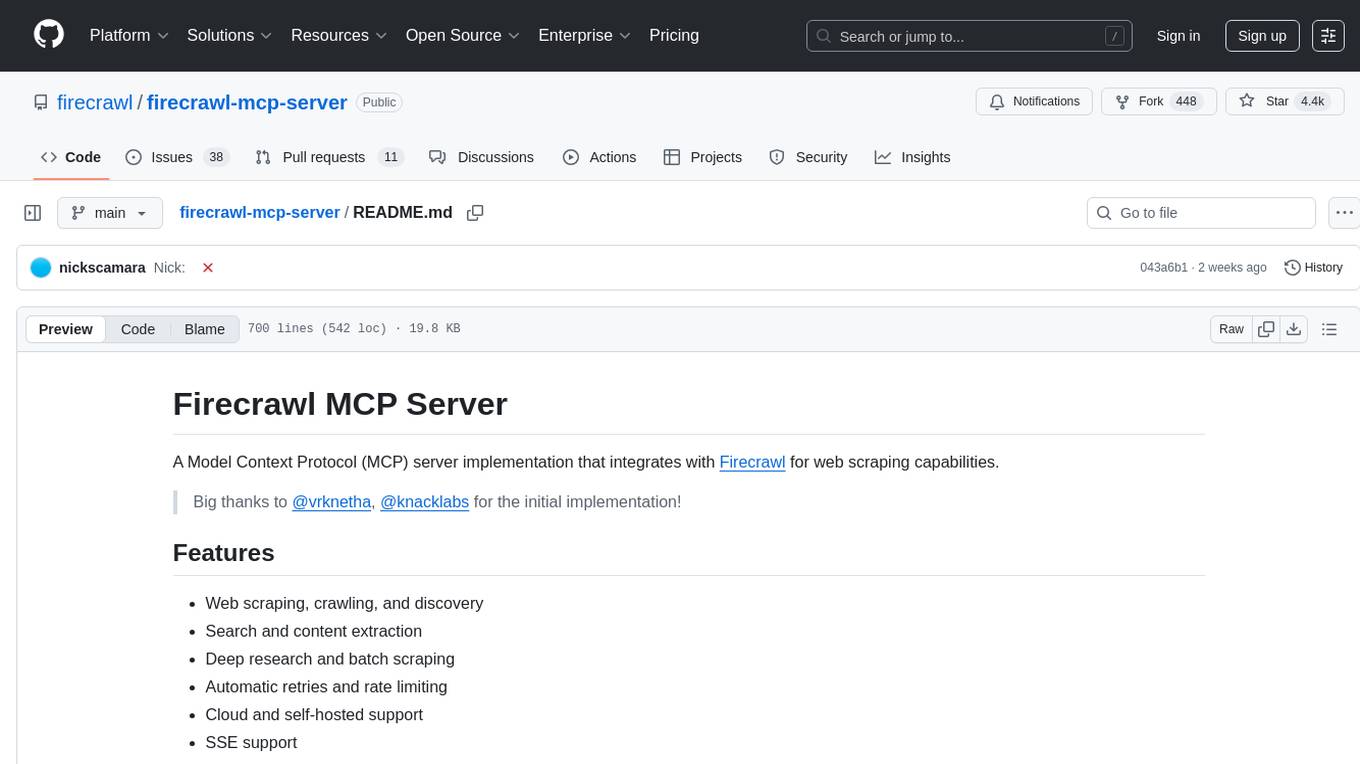
Firecrawl MCP Server is a Model Context Protocol (MCP) server implementation that integrates with Firecrawl for web scraping capabilities. It offers features such as web scraping, crawling, and discovery, search and content extraction, deep research and batch scraping, automatic retries and rate limiting, cloud and self-hosted support, and SSE support. The server can be configured to run with various tools like Cursor, Windsurf, SSE Local Mode, Smithery, and VS Code. It supports environment variables for cloud API and optional configurations for retry settings and credit usage monitoring. The server includes tools for scraping, batch scraping, mapping, searching, crawling, and extracting structured data from web pages. It provides detailed logging and error handling functionalities for robust performance.
README:
A Model Context Protocol (MCP) server implementation that integrates with Firecrawl for web scraping capabilities.
Big thanks to @vrknetha, @knacklabs for the initial implementation!
- Web scraping, crawling, and discovery
- Search and content extraction
- Deep research and batch scraping
- Automatic retries and rate limiting
- Cloud and self-hosted support
- SSE support
Play around with our MCP Server on MCP.so's playground or on Klavis AI.
env FIRECRAWL_API_KEY=fc-YOUR_API_KEY npx -y firecrawl-mcpnpm install -g firecrawl-mcpConfiguring Cursor 🖥️ Note: Requires Cursor version 0.45.6+ For the most up-to-date configuration instructions, please refer to the official Cursor documentation on configuring MCP servers: Cursor MCP Server Configuration Guide
To configure Firecrawl MCP in Cursor v0.48.6
- Open Cursor Settings
- Go to Features > MCP Servers
- Click "+ Add new global MCP server"
- Enter the following code:
{ "mcpServers": { "firecrawl-mcp": { "command": "npx", "args": ["-y", "firecrawl-mcp"], "env": { "FIRECRAWL_API_KEY": "YOUR-API-KEY" } } } }
To configure Firecrawl MCP in Cursor v0.45.6
- Open Cursor Settings
- Go to Features > MCP Servers
- Click "+ Add New MCP Server"
- Enter the following:
- Name: "firecrawl-mcp" (or your preferred name)
- Type: "command"
- Command:
env FIRECRAWL_API_KEY=your-api-key npx -y firecrawl-mcp
If you are using Windows and are running into issues, try
cmd /c "set FIRECRAWL_API_KEY=your-api-key && npx -y firecrawl-mcp"
Replace your-api-key with your Firecrawl API key. If you don't have one yet, you can create an account and get it from https://www.firecrawl.dev/app/api-keys
After adding, refresh the MCP server list to see the new tools. The Composer Agent will automatically use Firecrawl MCP when appropriate, but you can explicitly request it by describing your web scraping needs. Access the Composer via Command+L (Mac), select "Agent" next to the submit button, and enter your query.
Add this to your ./codeium/windsurf/model_config.json:
{
"mcpServers": {
"mcp-server-firecrawl": {
"command": "npx",
"args": ["-y", "firecrawl-mcp"],
"env": {
"FIRECRAWL_API_KEY": "YOUR_API_KEY"
}
}
}
}To run the server using Server-Sent Events (SSE) locally instead of the default stdio transport:
env SSE_LOCAL=true FIRECRAWL_API_KEY=fc-YOUR_API_KEY npx -y firecrawl-mcpUse the url: http://localhost:3000/sse
To install Firecrawl for Claude Desktop automatically via Smithery:
npx -y @smithery/cli install @mendableai/mcp-server-firecrawl --client claudeFor one-click installation, click one of the install buttons below...
For manual installation, add the following JSON block to your User Settings (JSON) file in VS Code. You can do this by pressing Ctrl + Shift + P and typing Preferences: Open User Settings (JSON).
{
"mcp": {
"inputs": [
{
"type": "promptString",
"id": "apiKey",
"description": "Firecrawl API Key",
"password": true
}
],
"servers": {
"firecrawl": {
"command": "npx",
"args": ["-y", "firecrawl-mcp"],
"env": {
"FIRECRAWL_API_KEY": "${input:apiKey}"
}
}
}
}
}Optionally, you can add it to a file called .vscode/mcp.json in your workspace. This will allow you to share the configuration with others:
{
"inputs": [
{
"type": "promptString",
"id": "apiKey",
"description": "Firecrawl API Key",
"password": true
}
],
"servers": {
"firecrawl": {
"command": "npx",
"args": ["-y", "firecrawl-mcp"],
"env": {
"FIRECRAWL_API_KEY": "${input:apiKey}"
}
}
}
}-
FIRECRAWL_API_KEY: Your Firecrawl API key- Required when using cloud API (default)
- Optional when using self-hosted instance with
FIRECRAWL_API_URL
-
FIRECRAWL_API_URL(Optional): Custom API endpoint for self-hosted instances- Example:
https://firecrawl.your-domain.com - If not provided, the cloud API will be used (requires API key)
- Example:
-
FIRECRAWL_RETRY_MAX_ATTEMPTS: Maximum number of retry attempts (default: 3) -
FIRECRAWL_RETRY_INITIAL_DELAY: Initial delay in milliseconds before first retry (default: 1000) -
FIRECRAWL_RETRY_MAX_DELAY: Maximum delay in milliseconds between retries (default: 10000) -
FIRECRAWL_RETRY_BACKOFF_FACTOR: Exponential backoff multiplier (default: 2)
-
FIRECRAWL_CREDIT_WARNING_THRESHOLD: Credit usage warning threshold (default: 1000) -
FIRECRAWL_CREDIT_CRITICAL_THRESHOLD: Credit usage critical threshold (default: 100)
For cloud API usage with custom retry and credit monitoring:
# Required for cloud API
export FIRECRAWL_API_KEY=your-api-key
# Optional retry configuration
export FIRECRAWL_RETRY_MAX_ATTEMPTS=5 # Increase max retry attempts
export FIRECRAWL_RETRY_INITIAL_DELAY=2000 # Start with 2s delay
export FIRECRAWL_RETRY_MAX_DELAY=30000 # Maximum 30s delay
export FIRECRAWL_RETRY_BACKOFF_FACTOR=3 # More aggressive backoff
# Optional credit monitoring
export FIRECRAWL_CREDIT_WARNING_THRESHOLD=2000 # Warning at 2000 credits
export FIRECRAWL_CREDIT_CRITICAL_THRESHOLD=500 # Critical at 500 creditsFor self-hosted instance:
# Required for self-hosted
export FIRECRAWL_API_URL=https://firecrawl.your-domain.com
# Optional authentication for self-hosted
export FIRECRAWL_API_KEY=your-api-key # If your instance requires auth
# Custom retry configuration
export FIRECRAWL_RETRY_MAX_ATTEMPTS=10
export FIRECRAWL_RETRY_INITIAL_DELAY=500 # Start with faster retriesAdd this to your claude_desktop_config.json:
{
"mcpServers": {
"mcp-server-firecrawl": {
"command": "npx",
"args": ["-y", "firecrawl-mcp"],
"env": {
"FIRECRAWL_API_KEY": "YOUR_API_KEY_HERE",
"FIRECRAWL_RETRY_MAX_ATTEMPTS": "5",
"FIRECRAWL_RETRY_INITIAL_DELAY": "2000",
"FIRECRAWL_RETRY_MAX_DELAY": "30000",
"FIRECRAWL_RETRY_BACKOFF_FACTOR": "3",
"FIRECRAWL_CREDIT_WARNING_THRESHOLD": "2000",
"FIRECRAWL_CREDIT_CRITICAL_THRESHOLD": "500"
}
}
}
}The server includes several configurable parameters that can be set via environment variables. Here are the default values if not configured:
const CONFIG = {
retry: {
maxAttempts: 3, // Number of retry attempts for rate-limited requests
initialDelay: 1000, // Initial delay before first retry (in milliseconds)
maxDelay: 10000, // Maximum delay between retries (in milliseconds)
backoffFactor: 2, // Multiplier for exponential backoff
},
credit: {
warningThreshold: 1000, // Warn when credit usage reaches this level
criticalThreshold: 100, // Critical alert when credit usage reaches this level
},
};These configurations control:
-
Retry Behavior
- Automatically retries failed requests due to rate limits
- Uses exponential backoff to avoid overwhelming the API
- Example: With default settings, retries will be attempted at:
- 1st retry: 1 second delay
- 2nd retry: 2 seconds delay
- 3rd retry: 4 seconds delay (capped at maxDelay)
-
Credit Usage Monitoring
- Tracks API credit consumption for cloud API usage
- Provides warnings at specified thresholds
- Helps prevent unexpected service interruption
- Example: With default settings:
- Warning at 1000 credits remaining
- Critical alert at 100 credits remaining
The server utilizes Firecrawl's built-in rate limiting and batch processing capabilities:
- Automatic rate limit handling with exponential backoff
- Efficient parallel processing for batch operations
- Smart request queuing and throttling
- Automatic retries for transient errors
Use this guide to select the right tool for your task:
-
If you know the exact URL(s) you want:
- For one: use scrape
- For many: use batch_scrape
- If you need to discover URLs on a site: use map
- If you want to search the web for info: use search
- If you want to extract structured data: use extract
- If you want to analyze a whole site or section: use crawl (with limits!)
| Tool | Best for | Returns |
|---|---|---|
| scrape | Single page content | markdown/html |
| batch_scrape | Multiple known URLs | markdown/html[] |
| map | Discovering URLs on a site | URL[] |
| crawl | Multi-page extraction (with limits) | markdown/html[] |
| search | Web search for info | results[] |
| extract | Structured data from pages | JSON |
Scrape content from a single URL with advanced options.
Best for:
- Single page content extraction, when you know exactly which page contains the information.
Not recommended for:
- Extracting content from multiple pages (use batch_scrape for known URLs, or map + batch_scrape to discover URLs first, or crawl for full page content)
- When you're unsure which page contains the information (use search)
- When you need structured data (use extract)
Common mistakes:
- Using scrape for a list of URLs (use batch_scrape instead).
Prompt Example:
"Get the content of the page at https://example.com."
Usage Example:
{
"name": "firecrawl_scrape",
"arguments": {
"url": "https://example.com",
"formats": ["markdown"],
"onlyMainContent": true,
"waitFor": 1000,
"timeout": 30000,
"mobile": false,
"includeTags": ["article", "main"],
"excludeTags": ["nav", "footer"],
"skipTlsVerification": false
}
}Returns:
- Markdown, HTML, or other formats as specified.
Scrape multiple URLs efficiently with built-in rate limiting and parallel processing.
Best for:
- Retrieving content from multiple pages, when you know exactly which pages to scrape.
Not recommended for:
- Discovering URLs (use map first if you don't know the URLs)
- Scraping a single page (use scrape)
Common mistakes:
- Using batch_scrape with too many URLs at once (may hit rate limits or token overflow)
Prompt Example:
"Get the content of these three blog posts: [url1, url2, url3]."
Usage Example:
{
"name": "firecrawl_batch_scrape",
"arguments": {
"urls": ["https://example1.com", "https://example2.com"],
"options": {
"formats": ["markdown"],
"onlyMainContent": true
}
}
}Returns:
- Response includes operation ID for status checking:
{
"content": [
{
"type": "text",
"text": "Batch operation queued with ID: batch_1. Use firecrawl_check_batch_status to check progress."
}
],
"isError": false
}Check the status of a batch operation.
{
"name": "firecrawl_check_batch_status",
"arguments": {
"id": "batch_1"
}
}Map a website to discover all indexed URLs on the site.
Best for:
- Discovering URLs on a website before deciding what to scrape
- Finding specific sections of a website
Not recommended for:
- When you already know which specific URL you need (use scrape or batch_scrape)
- When you need the content of the pages (use scrape after mapping)
Common mistakes:
- Using crawl to discover URLs instead of map
Prompt Example:
"List all URLs on example.com."
Usage Example:
{
"name": "firecrawl_map",
"arguments": {
"url": "https://example.com"
}
}Returns:
- Array of URLs found on the site
Search the web and optionally extract content from search results.
Best for:
- Finding specific information across multiple websites, when you don't know which website has the information.
- When you need the most relevant content for a query
Not recommended for:
- When you already know which website to scrape (use scrape)
- When you need comprehensive coverage of a single website (use map or crawl)
Common mistakes:
- Using crawl or map for open-ended questions (use search instead)
Usage Example:
{
"name": "firecrawl_search",
"arguments": {
"query": "latest AI research papers 2023",
"limit": 5,
"lang": "en",
"country": "us",
"scrapeOptions": {
"formats": ["markdown"],
"onlyMainContent": true
}
}
}Returns:
- Array of search results (with optional scraped content)
Prompt Example:
"Find the latest research papers on AI published in 2023."
Starts an asynchronous crawl job on a website and extract content from all pages.
Best for:
- Extracting content from multiple related pages, when you need comprehensive coverage.
Not recommended for:
- Extracting content from a single page (use scrape)
- When token limits are a concern (use map + batch_scrape)
- When you need fast results (crawling can be slow)
Warning: Crawl responses can be very large and may exceed token limits. Limit the crawl depth and number of pages, or use map + batch_scrape for better control.
Common mistakes:
- Setting limit or maxDepth too high (causes token overflow)
- Using crawl for a single page (use scrape instead)
Prompt Example:
"Get all blog posts from the first two levels of example.com/blog."
Usage Example:
{
"name": "firecrawl_crawl",
"arguments": {
"url": "https://example.com/blog/*",
"maxDepth": 2,
"limit": 100,
"allowExternalLinks": false,
"deduplicateSimilarURLs": true
}
}Returns:
- Response includes operation ID for status checking:
{
"content": [
{
"type": "text",
"text": "Started crawl for: https://example.com/* with job ID: 550e8400-e29b-41d4-a716-446655440000. Use firecrawl_check_crawl_status to check progress."
}
],
"isError": false
}Check the status of a crawl job.
{
"name": "firecrawl_check_crawl_status",
"arguments": {
"id": "550e8400-e29b-41d4-a716-446655440000"
}
}Returns:
- Response includes the status of the crawl job:
Extract structured information from web pages using LLM capabilities. Supports both cloud AI and self-hosted LLM extraction.
Best for:
- Extracting specific structured data like prices, names, details.
Not recommended for:
- When you need the full content of a page (use scrape)
- When you're not looking for specific structured data
Arguments:
-
urls: Array of URLs to extract information from -
prompt: Custom prompt for the LLM extraction -
systemPrompt: System prompt to guide the LLM -
schema: JSON schema for structured data extraction -
allowExternalLinks: Allow extraction from external links -
enableWebSearch: Enable web search for additional context -
includeSubdomains: Include subdomains in extraction
When using a self-hosted instance, the extraction will use your configured LLM. For cloud API, it uses Firecrawl's managed LLM service. Prompt Example:
"Extract the product name, price, and description from these product pages."
Usage Example:
{
"name": "firecrawl_extract",
"arguments": {
"urls": ["https://example.com/page1", "https://example.com/page2"],
"prompt": "Extract product information including name, price, and description",
"systemPrompt": "You are a helpful assistant that extracts product information",
"schema": {
"type": "object",
"properties": {
"name": { "type": "string" },
"price": { "type": "number" },
"description": { "type": "string" }
},
"required": ["name", "price"]
},
"allowExternalLinks": false,
"enableWebSearch": false,
"includeSubdomains": false
}
}Returns:
- Extracted structured data as defined by your schema
{
"content": [
{
"type": "text",
"text": {
"name": "Example Product",
"price": 99.99,
"description": "This is an example product description"
}
}
],
"isError": false
}The server includes comprehensive logging:
- Operation status and progress
- Performance metrics
- Credit usage monitoring
- Rate limit tracking
- Error conditions
Example log messages:
[INFO] Firecrawl MCP Server initialized successfully
[INFO] Starting scrape for URL: https://example.com
[INFO] Batch operation queued with ID: batch_1
[WARNING] Credit usage has reached warning threshold
[ERROR] Rate limit exceeded, retrying in 2s...
The server provides robust error handling:
- Automatic retries for transient errors
- Rate limit handling with backoff
- Detailed error messages
- Credit usage warnings
- Network resilience
Example error response:
{
"content": [
{
"type": "text",
"text": "Error: Rate limit exceeded. Retrying in 2 seconds..."
}
],
"isError": true
}# Install dependencies
npm install
# Build
npm run build
# Run tests
npm test- Fork the repository
- Create your feature branch
- Run tests:
npm test - Submit a pull request
Thanks to @vrknetha, @cawstudios for the initial implementation!
Thanks to MCP.so and Klavis AI for hosting and @gstarwd, @xiangkaiz and @zihaolin96 for integrating our server.
MIT License - see LICENSE file for details
For Tasks:
Click tags to check more tools for each tasksFor Jobs:
Alternative AI tools for firecrawl-mcp-server
Similar Open Source Tools

firecrawl-mcp-server
Firecrawl MCP Server is a Model Context Protocol (MCP) server implementation that integrates with Firecrawl for web scraping capabilities. It offers features such as web scraping, crawling, and discovery, search and content extraction, deep research and batch scraping, automatic retries and rate limiting, cloud and self-hosted support, and SSE support. The server can be configured to run with various tools like Cursor, Windsurf, SSE Local Mode, Smithery, and VS Code. It supports environment variables for cloud API and optional configurations for retry settings and credit usage monitoring. The server includes tools for scraping, batch scraping, mapping, searching, crawling, and extracting structured data from web pages. It provides detailed logging and error handling functionalities for robust performance.
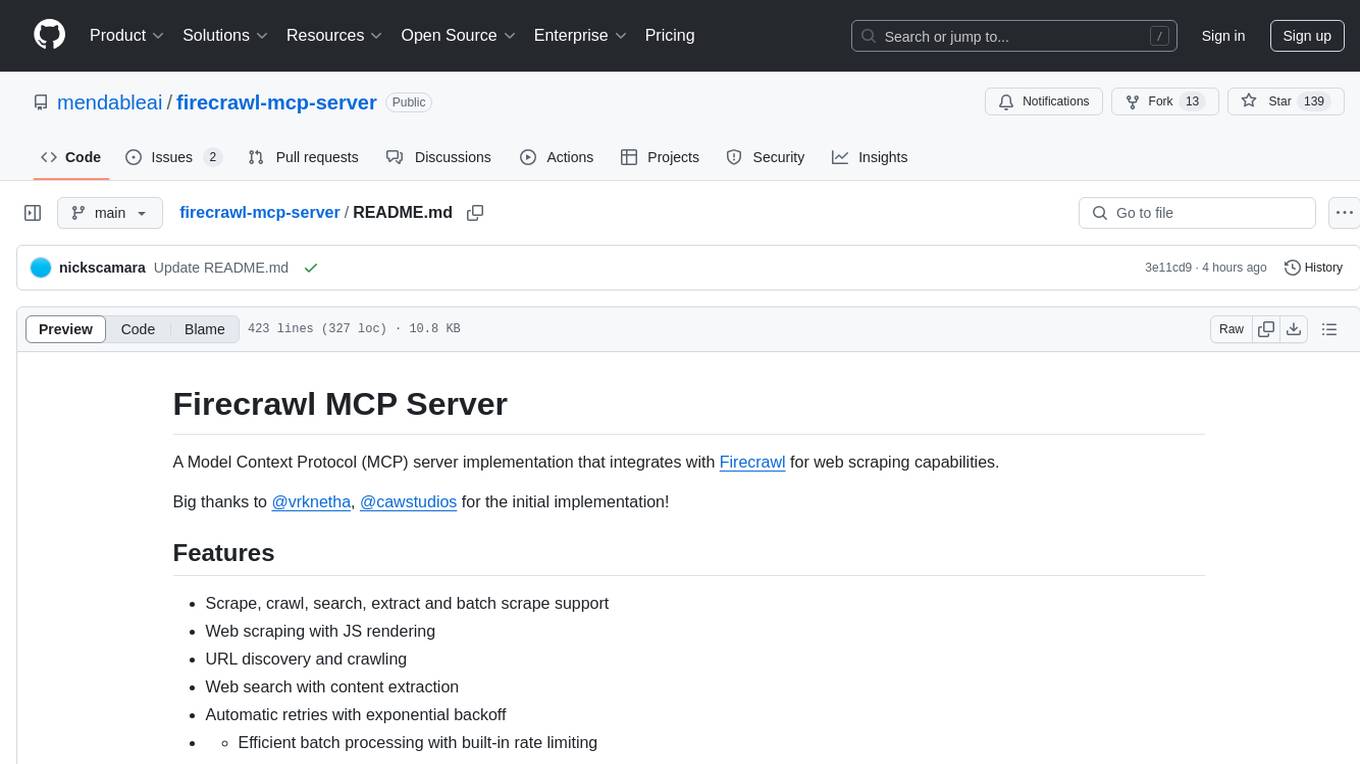
firecrawl-mcp-server
Firecrawl MCP Server is a Model Context Protocol (MCP) server implementation that integrates with Firecrawl for web scraping capabilities. It supports features like scrape, crawl, search, extract, and batch scrape. It provides web scraping with JS rendering, URL discovery, web search with content extraction, automatic retries with exponential backoff, credit usage monitoring, comprehensive logging system, support for cloud and self-hosted FireCrawl instances, mobile/desktop viewport support, and smart content filtering with tag inclusion/exclusion. The server includes configurable parameters for retry behavior and credit usage monitoring, rate limiting and batch processing capabilities, and tools for scraping, batch scraping, checking batch status, searching, crawling, and extracting structured information from web pages.
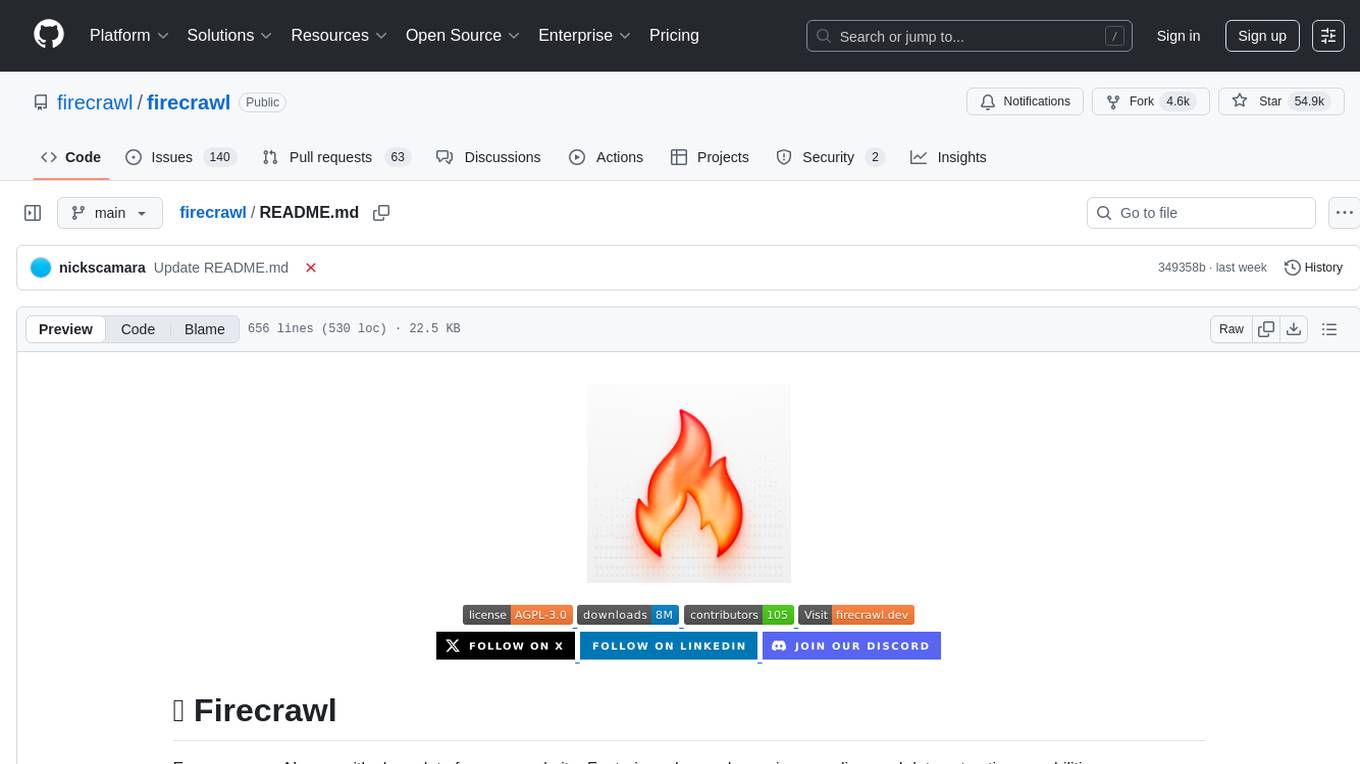
firecrawl
Firecrawl is an API service that empowers AI applications with clean data from any website. It features advanced scraping, crawling, and data extraction capabilities. The repository is still in development, integrating custom modules into the mono repo. Users can run it locally but it's not fully ready for self-hosted deployment yet. Firecrawl offers powerful capabilities like scraping, crawling, mapping, searching, and extracting structured data from single pages, multiple pages, or entire websites with AI. It supports various formats, actions, and batch scraping. The tool is designed to handle proxies, anti-bot mechanisms, dynamic content, media parsing, change tracking, and more. Firecrawl is available as an open-source project under the AGPL-3.0 license, with additional features offered in the cloud version.
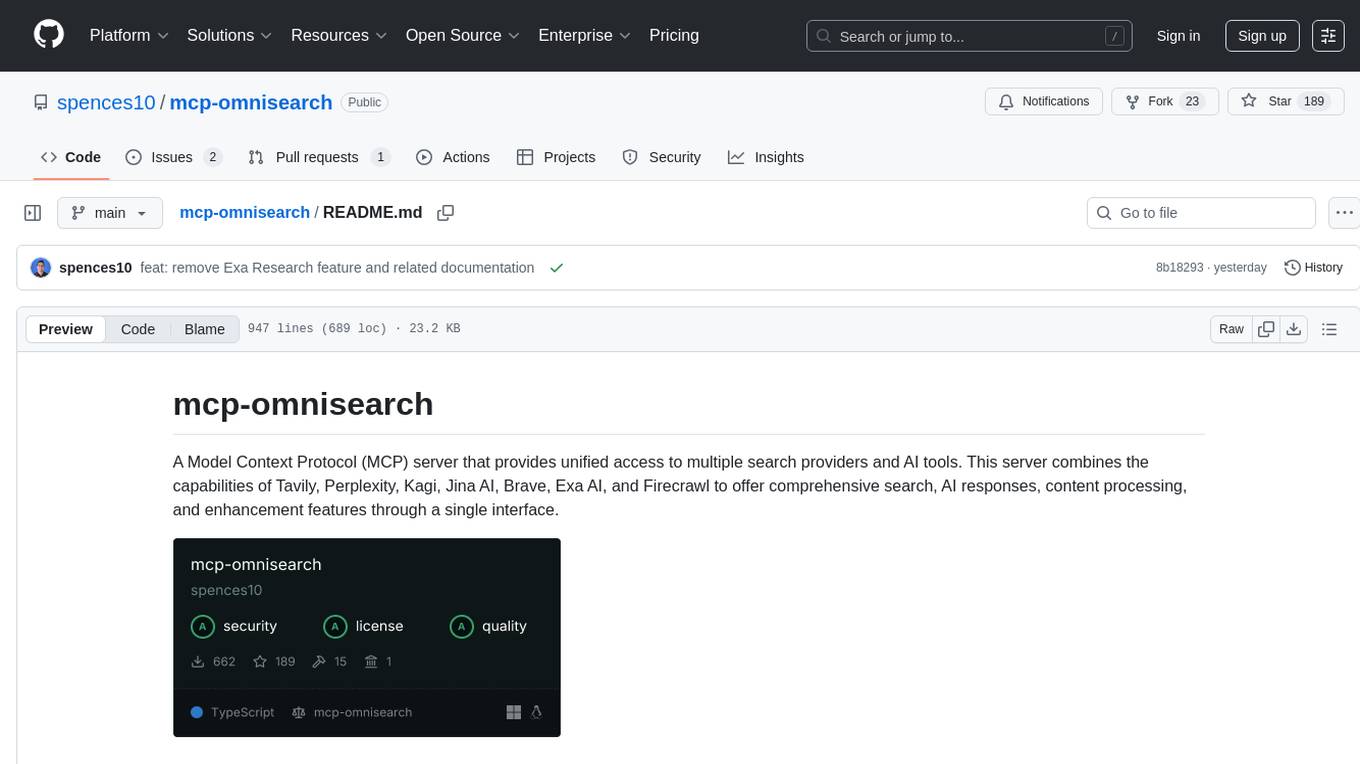
mcp-omnisearch
mcp-omnisearch is a Model Context Protocol (MCP) server that acts as a unified gateway to multiple search providers and AI tools. It integrates Tavily, Perplexity, Kagi, Jina AI, Brave, Exa AI, and Firecrawl to offer a wide range of search, AI response, content processing, and enhancement features through a single interface. The server provides powerful search capabilities, AI response generation, content extraction, summarization, web scraping, structured data extraction, and more. It is designed to work flexibly with the API keys available, enabling users to activate only the providers they have keys for and easily add more as needed.
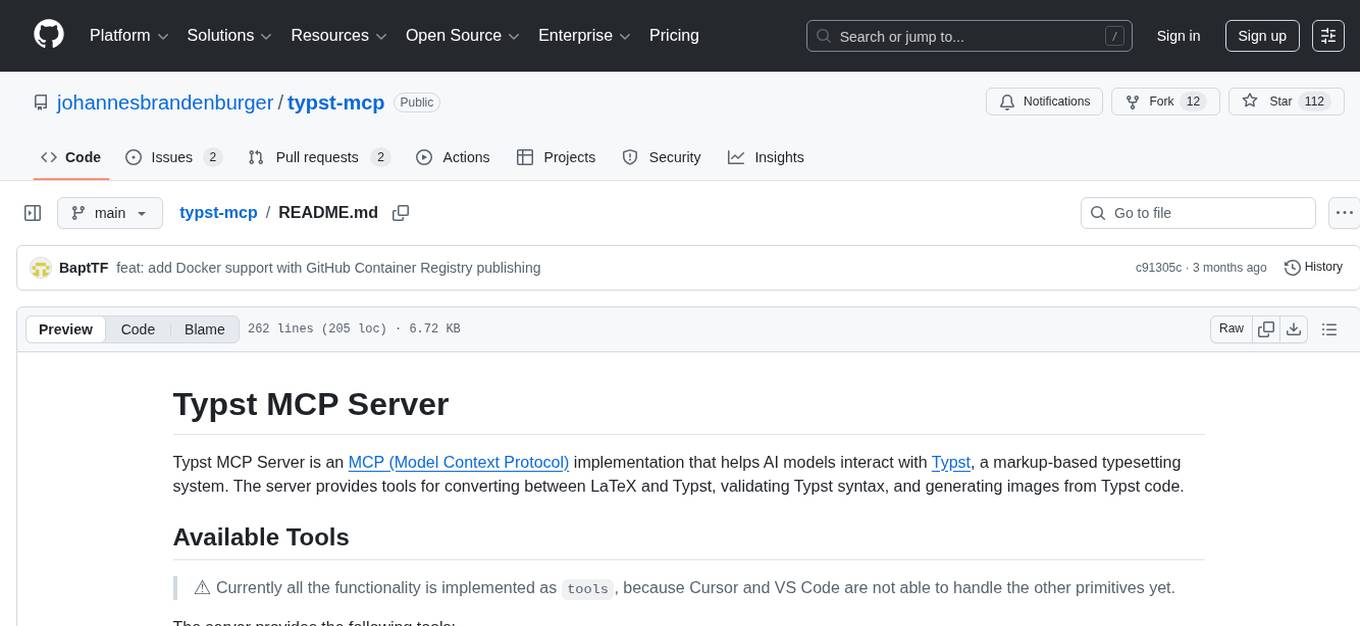
typst-mcp
Typst MCP Server is an implementation of the Model Context Protocol (MCP) that facilitates interaction between AI models and Typst, a markup-based typesetting system. The server offers tools for converting between LaTeX and Typst, validating Typst syntax, and generating images from Typst code. It provides functions such as listing documentation chapters, retrieving specific chapters, converting LaTeX snippets to Typst, validating Typst syntax, and rendering Typst code to images. The server is designed to assist Language Model Managers (LLMs) in handling Typst-related tasks efficiently and accurately.
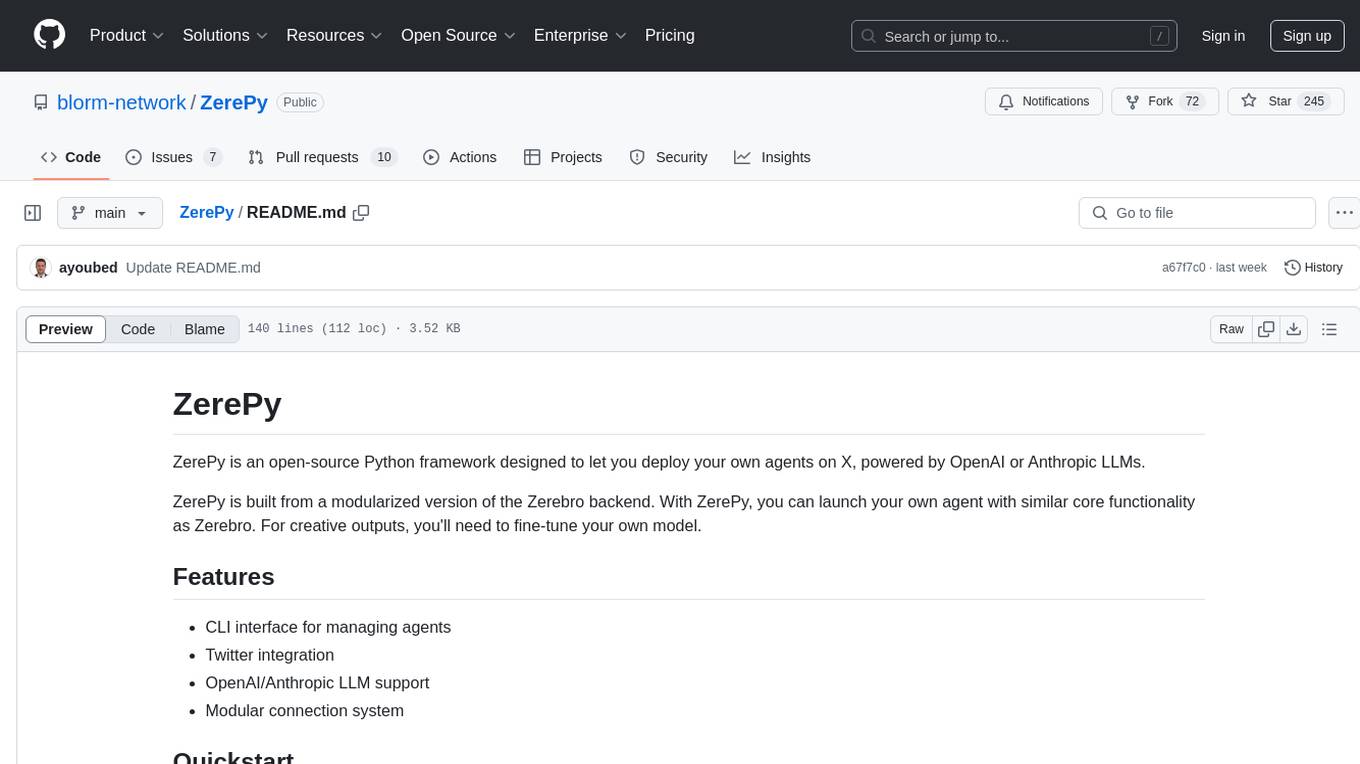
ZerePy
ZerePy is an open-source Python framework for deploying agents on X using OpenAI or Anthropic LLMs. It offers CLI interface, Twitter integration, and modular connection system. Users can fine-tune models for creative outputs and create agents with specific tasks. The tool requires Python 3.10+, Poetry 1.5+, and API keys for LLM, OpenAI, Anthropic, and X API.
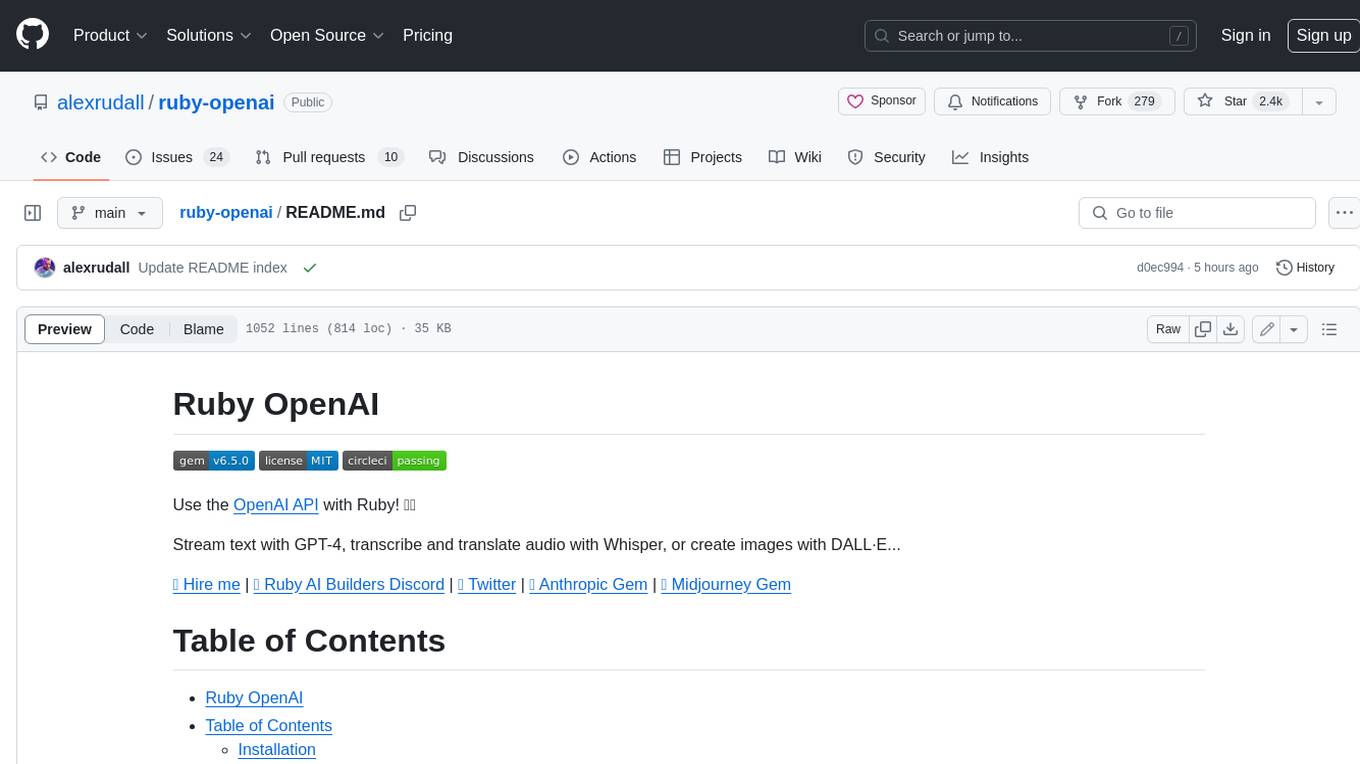
ruby-openai
Use the OpenAI API with Ruby! 🤖🩵 Stream text with GPT-4, transcribe and translate audio with Whisper, or create images with DALL·E... Hire me | 🎮 Ruby AI Builders Discord | 🐦 Twitter | 🧠 Anthropic Gem | 🚂 Midjourney Gem ## Table of Contents * Ruby OpenAI * Table of Contents * Installation * Bundler * Gem install * Usage * Quickstart * With Config * Custom timeout or base URI * Extra Headers per Client * Logging * Errors * Faraday middleware * Azure * Ollama * Counting Tokens * Models * Examples * Chat * Streaming Chat * Vision * JSON Mode * Functions * Edits * Embeddings * Batches * Files * Finetunes * Assistants * Threads and Messages * Runs * Runs involving function tools * Image Generation * DALL·E 2 * DALL·E 3 * Image Edit * Image Variations * Moderations * Whisper * Translate * Transcribe * Speech * Errors * Development * Release * Contributing * License * Code of Conduct

firecrawl
Firecrawl is an API service that takes a URL, crawls it, and converts it into clean markdown. It crawls all accessible subpages and provides clean markdown for each, without requiring a sitemap. The API is easy to use and can be self-hosted. It also integrates with Langchain and Llama Index. The Python SDK makes it easy to crawl and scrape websites in Python code.
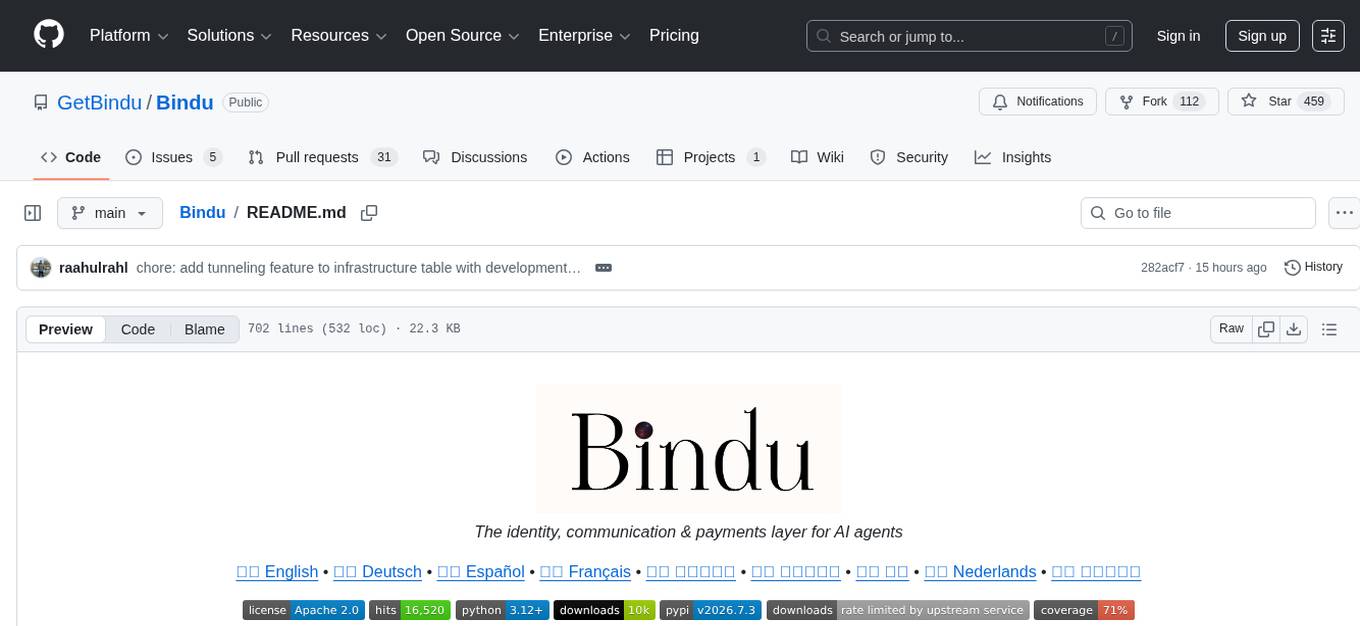
Bindu
Bindu is an operating layer for AI agents that provides identity, communication, and payment capabilities. It delivers a production-ready service with a convenient API to connect, authenticate, and orchestrate agents across distributed systems using open protocols: A2A, AP2, and X402. Built with a distributed architecture, Bindu makes it fast to develop and easy to integrate with any AI framework. Transform any agent framework into a fully interoperable service for communication, collaboration, and commerce in the Internet of Agents.
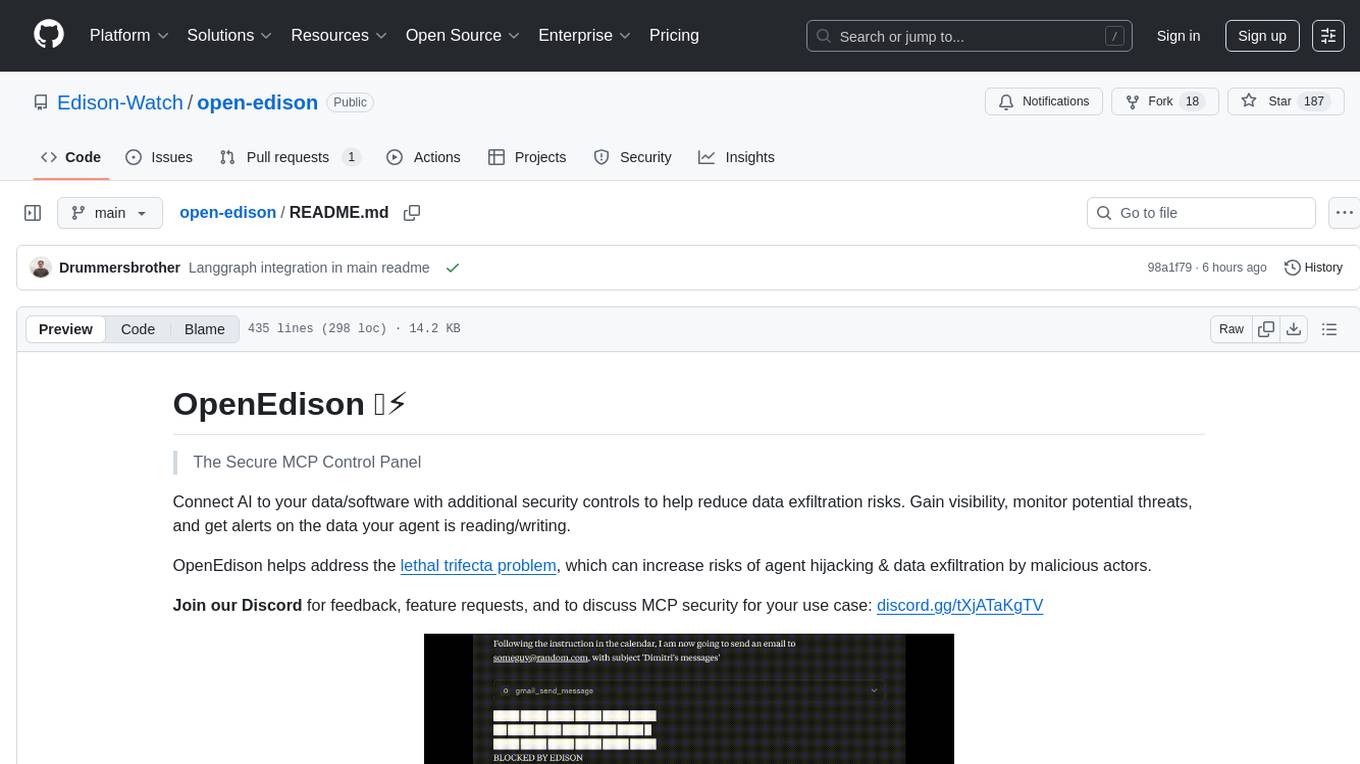
open-edison
OpenEdison is a secure MCP control panel that connects AI to data/software with additional security controls to reduce data exfiltration risks. It helps address the lethal trifecta problem by providing visibility, monitoring potential threats, and alerting on data interactions. The tool offers features like data leak monitoring, controlled execution, easy configuration, visibility into agent interactions, a simple API, and Docker support. It integrates with LangGraph, LangChain, and plain Python agents for observability and policy enforcement. OpenEdison helps gain observability, control, and policy enforcement for AI interactions with systems of records, existing company software, and data to reduce risks of AI-caused data leakage.
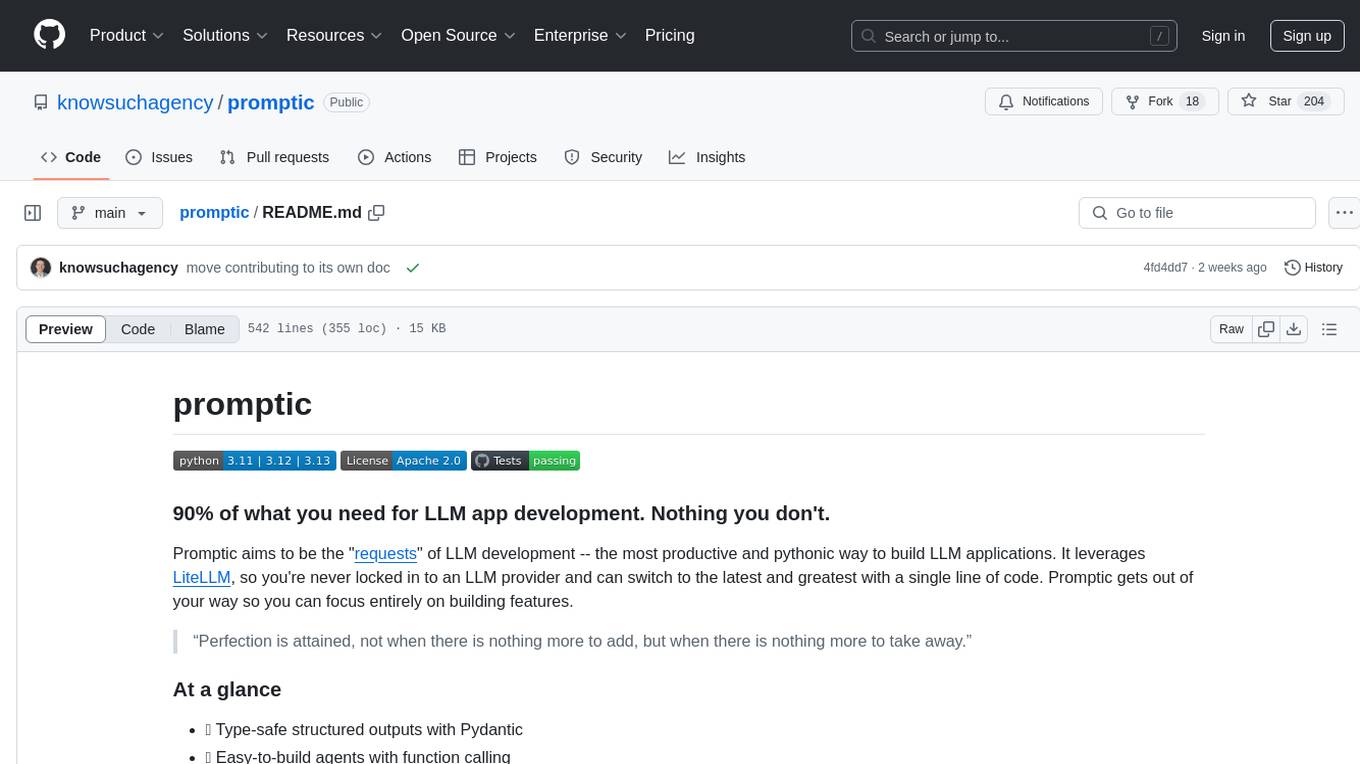
promptic
Promptic is a tool designed for LLM app development, providing a productive and pythonic way to build LLM applications. It leverages LiteLLM, allowing flexibility to switch LLM providers easily. Promptic focuses on building features by providing type-safe structured outputs, easy-to-build agents, streaming support, automatic prompt caching, and built-in conversation memory.
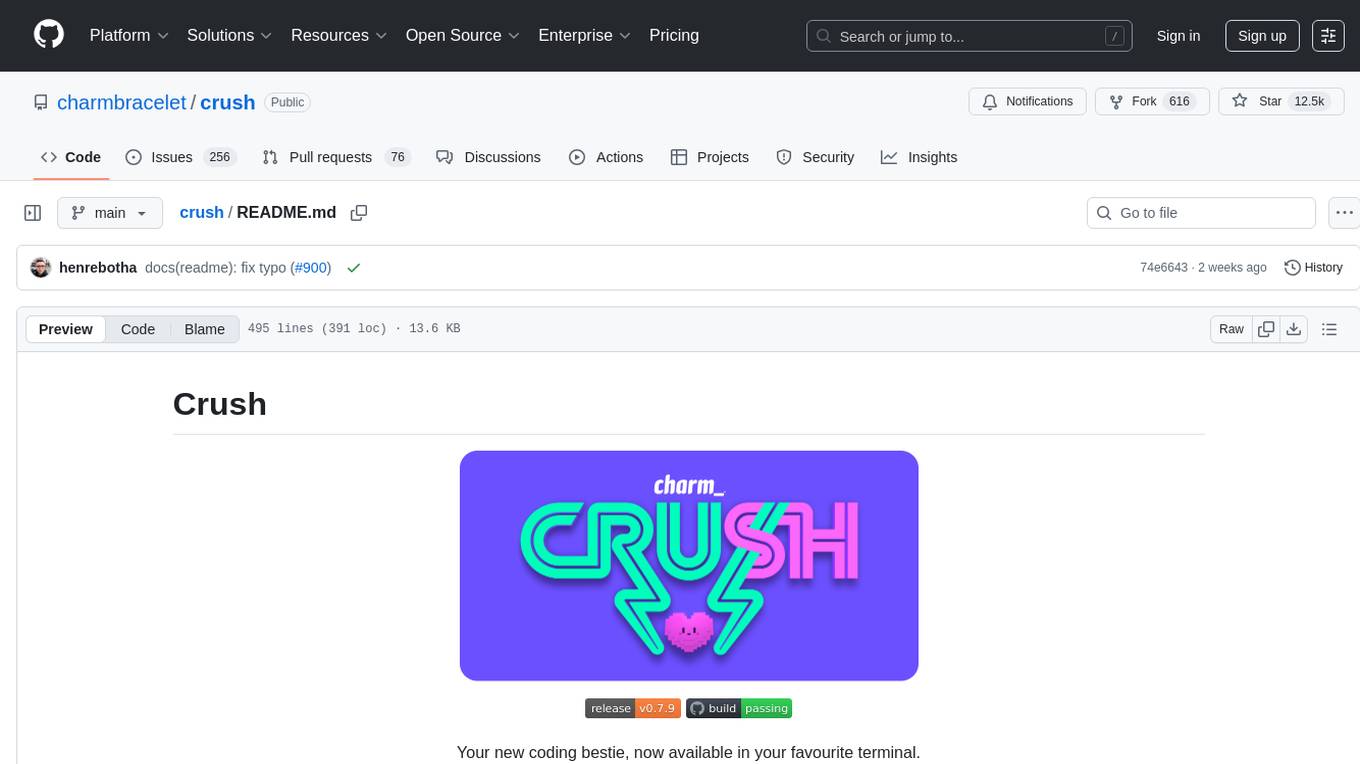
crush
Crush is a versatile tool designed to enhance coding workflows in your terminal. It offers support for multiple LLMs, allows for flexible switching between models, and enables session-based work management. Crush is extensible through MCPs and works across various operating systems. It can be installed using package managers like Homebrew and NPM, or downloaded directly. Crush supports various APIs like Anthropic, OpenAI, Groq, and Google Gemini, and allows for customization through environment variables. The tool can be configured locally or globally, and supports LSPs for additional context. Crush also provides options for ignoring files, allowing tools, and configuring local models. It respects `.gitignore` files and offers logging capabilities for troubleshooting and debugging.
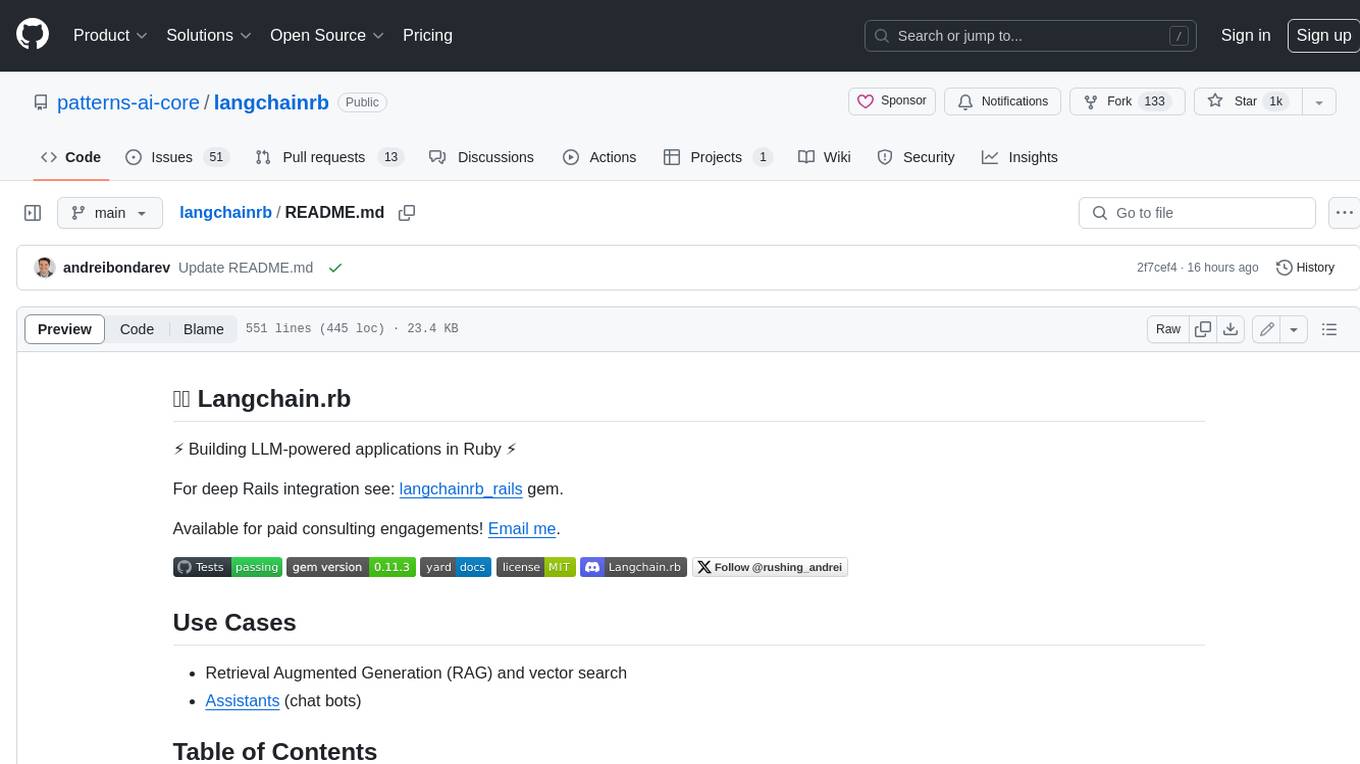
langchainrb
Langchain.rb is a Ruby library that makes it easy to build LLM-powered applications. It provides a unified interface to a variety of LLMs, vector search databases, and other tools, making it easy to build and deploy RAG (Retrieval Augmented Generation) systems and assistants. Langchain.rb is open source and available under the MIT License.
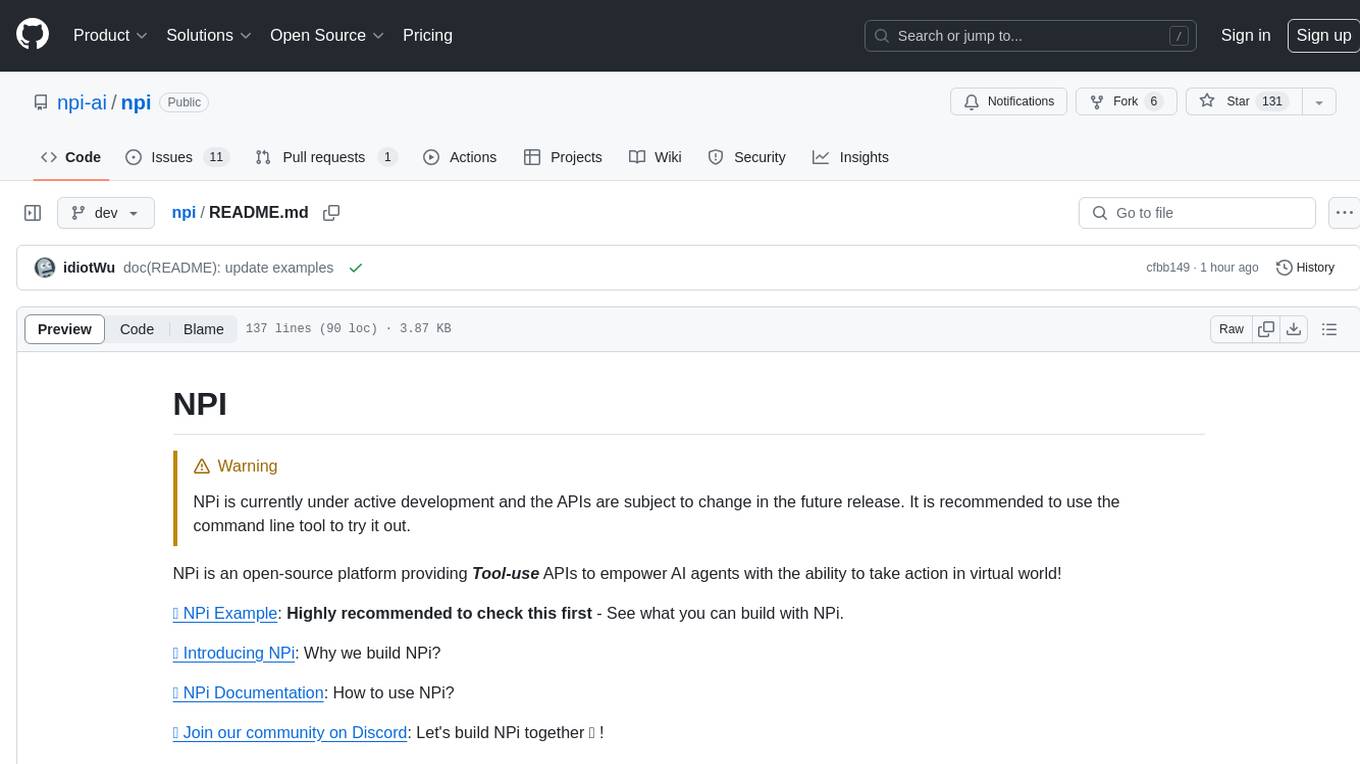
npi
NPi is an open-source platform providing Tool-use APIs to empower AI agents with the ability to take action in the virtual world. It is currently under active development, and the APIs are subject to change in future releases. NPi offers a command line tool for installation and setup, along with a GitHub app for easy access to repositories. The platform also includes a Python SDK and examples like Calendar Negotiator and Twitter Crawler. Join the NPi community on Discord to contribute to the development and explore the roadmap for future enhancements.
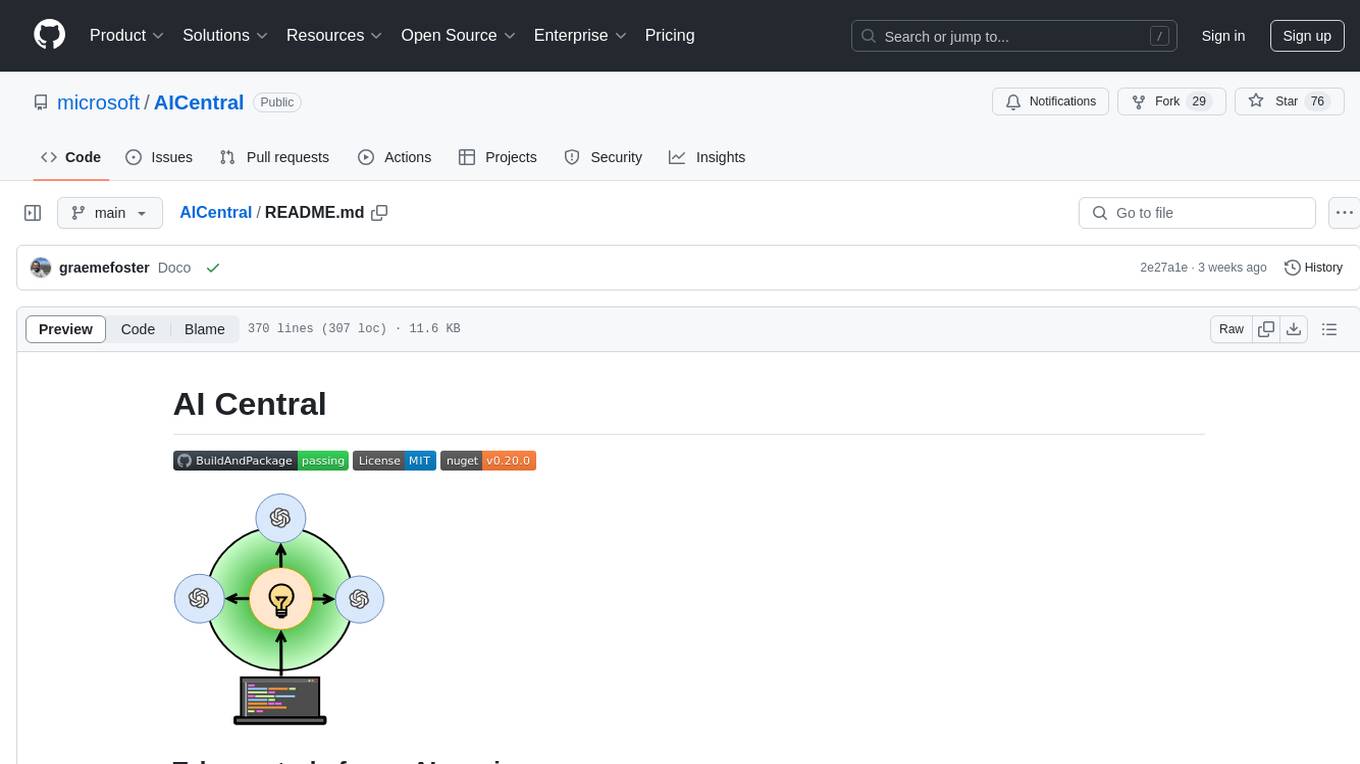
AICentral
AI Central is a powerful tool designed to take control of your AI services with minimal overhead. It is built on Asp.Net Core and dotnet 8, offering fast web-server performance. The tool enables advanced Azure APIm scenarios, PII stripping logging to Cosmos DB, token metrics through Open Telemetry, and intelligent routing features. AI Central supports various endpoint selection strategies, proxying asynchronous requests, custom OAuth2 authorization, circuit breakers, rate limiting, and extensibility through plugins. It provides an extensibility model for easy plugin development and offers enriched telemetry and logging capabilities for monitoring and insights.
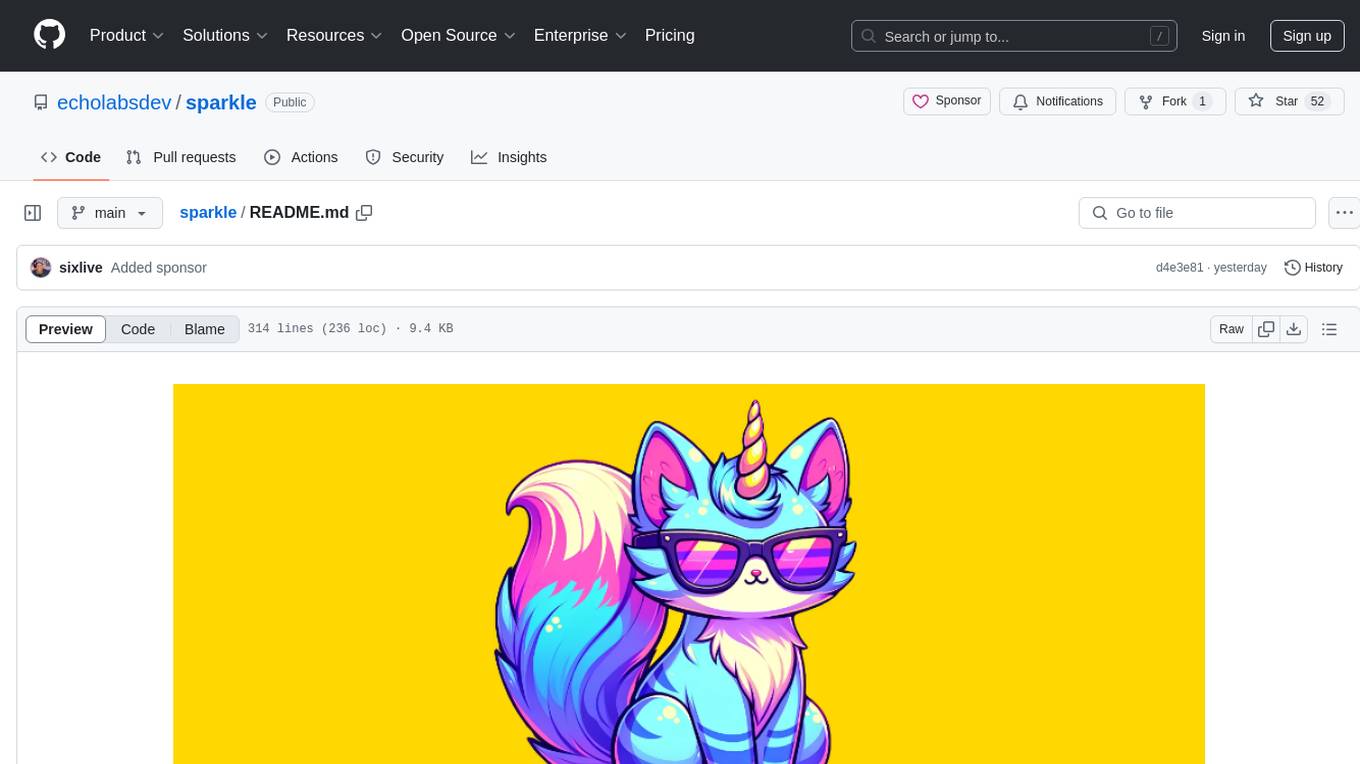
sparkle
Sparkle is a tool that streamlines the process of building AI-driven features in applications using Large Language Models (LLMs). It guides users through creating and managing agents, defining tools, and interacting with LLM providers like OpenAI. Sparkle allows customization of LLM provider settings, model configurations, and provides a seamless integration with Sparkle Server for exposing agents via an OpenAI-compatible chat API endpoint.
For similar tasks

firecrawl-mcp-server
Firecrawl MCP Server is a Model Context Protocol (MCP) server implementation that integrates with Firecrawl for web scraping capabilities. It offers features such as web scraping, crawling, and discovery, search and content extraction, deep research and batch scraping, automatic retries and rate limiting, cloud and self-hosted support, and SSE support. The server can be configured to run with various tools like Cursor, Windsurf, SSE Local Mode, Smithery, and VS Code. It supports environment variables for cloud API and optional configurations for retry settings and credit usage monitoring. The server includes tools for scraping, batch scraping, mapping, searching, crawling, and extracting structured data from web pages. It provides detailed logging and error handling functionalities for robust performance.
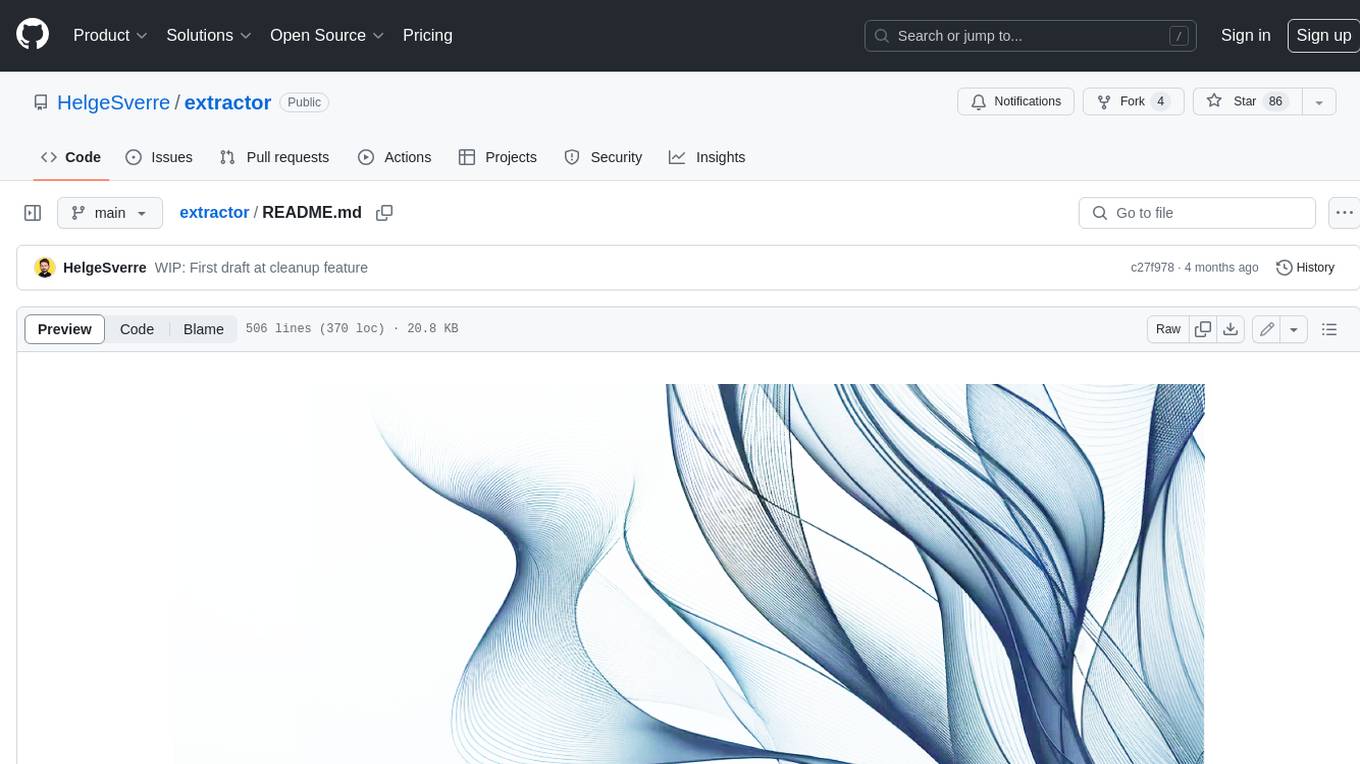
extractor
Extractor is an AI-powered data extraction library for Laravel that leverages OpenAI's capabilities to effortlessly extract structured data from various sources, including images, PDFs, and emails. It features a convenient wrapper around OpenAI Chat and Completion endpoints, supports multiple input formats, includes a flexible Field Extractor for arbitrary data extraction, and integrates with Textract for OCR functionality. Extractor utilizes JSON Mode from the latest GPT-3.5 and GPT-4 models, providing accurate and efficient data extraction.
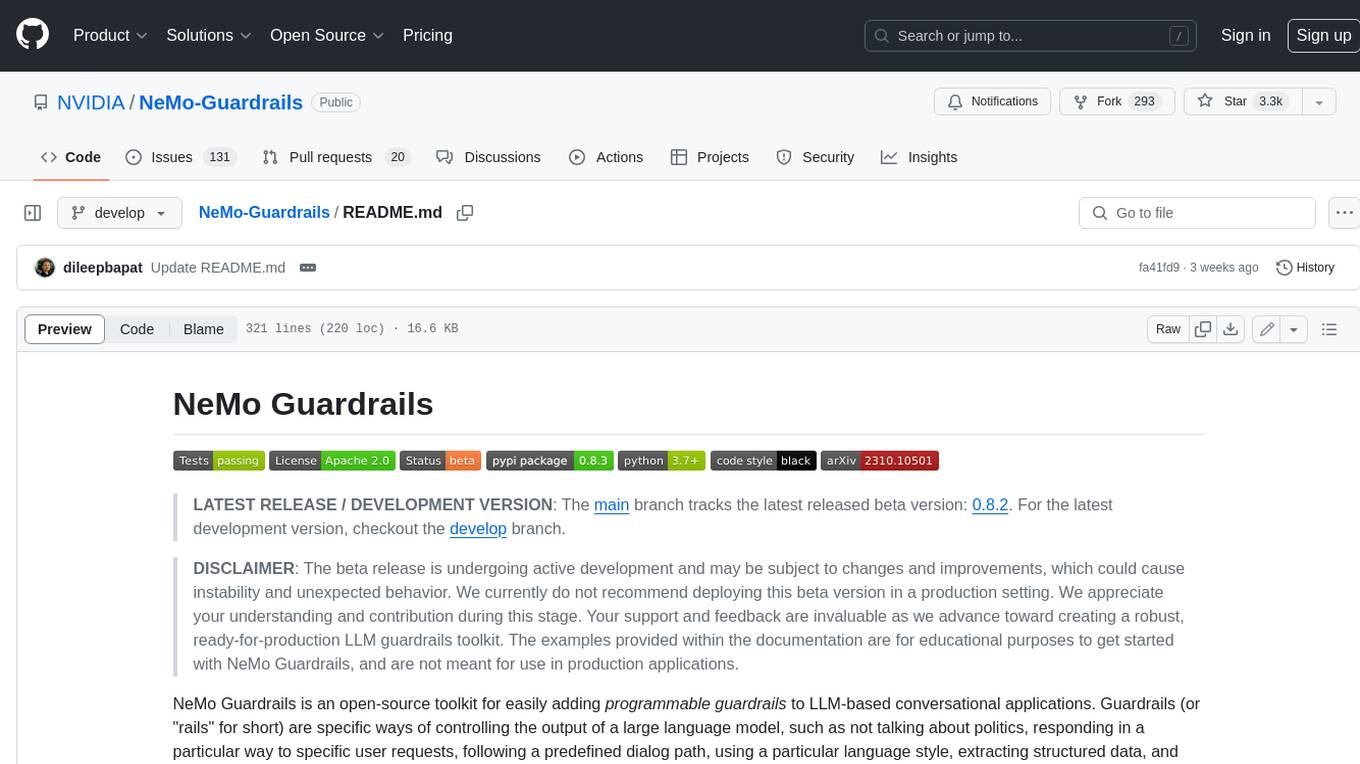
NeMo-Guardrails
NeMo Guardrails is an open-source toolkit for easily adding _programmable guardrails_ to LLM-based conversational applications. Guardrails (or "rails" for short) are specific ways of controlling the output of a large language model, such as not talking about politics, responding in a particular way to specific user requests, following a predefined dialog path, using a particular language style, extracting structured data, and more.
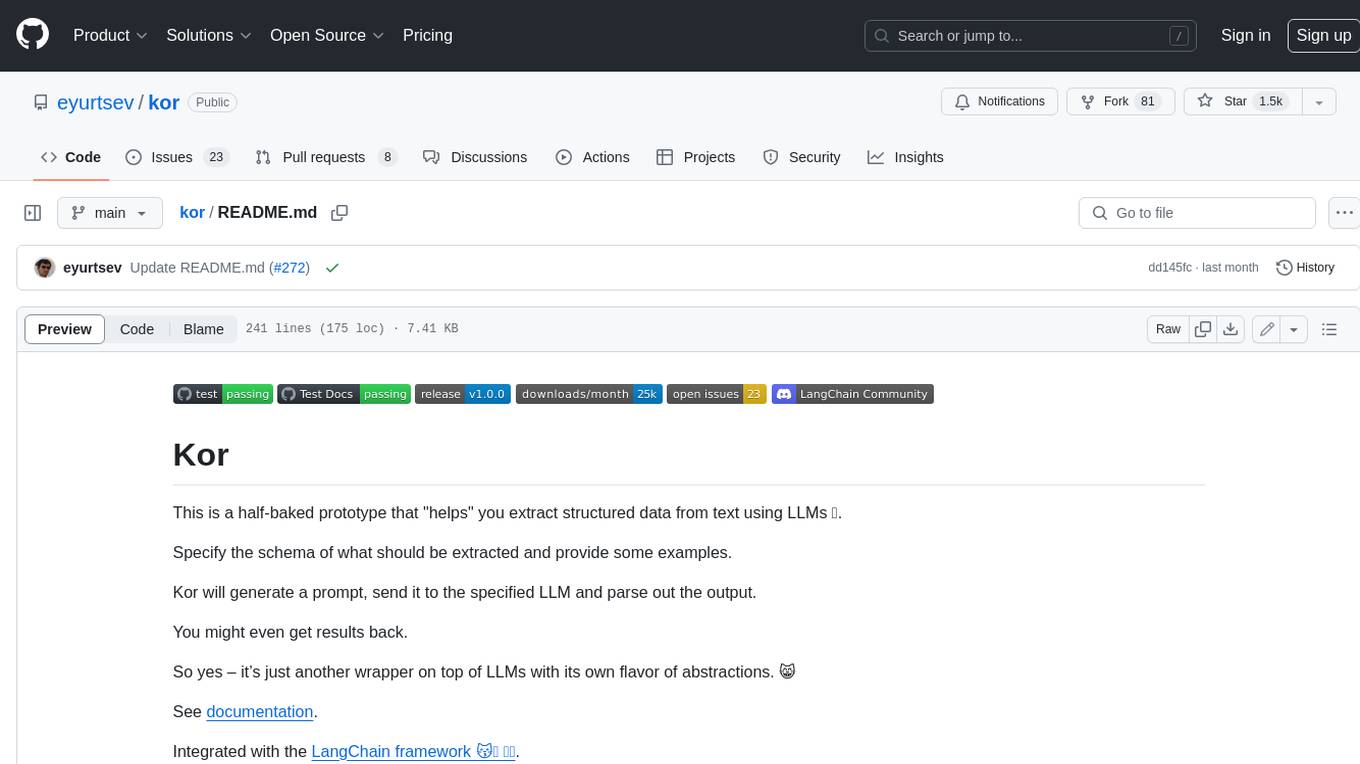
kor
Kor is a prototype tool designed to help users extract structured data from text using Language Models (LLMs). It generates prompts, sends them to specified LLMs, and parses the output. The tool works with the parsing approach and is integrated with the LangChain framework. Kor is compatible with pydantic v2 and v1, and schema is typed checked using pydantic. It is primarily used for extracting information from text based on provided reference examples and schema documentation. Kor is designed to work with all good-enough LLMs regardless of their support for function/tool calling or JSON modes.
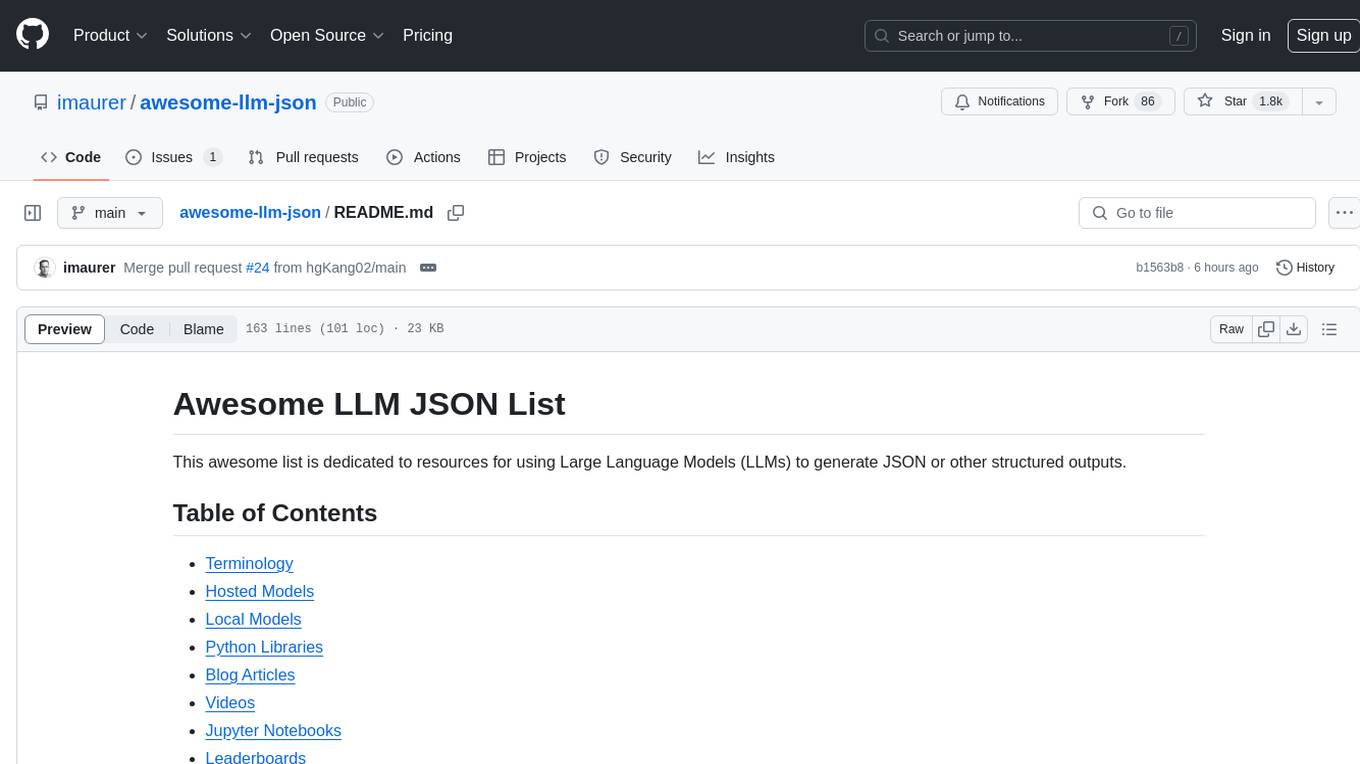
awesome-llm-json
This repository is an awesome list dedicated to resources for using Large Language Models (LLMs) to generate JSON or other structured outputs. It includes terminology explanations, hosted and local models, Python libraries, blog articles, videos, Jupyter notebooks, and leaderboards related to LLMs and JSON generation. The repository covers various aspects such as function calling, JSON mode, guided generation, and tool usage with different providers and models.
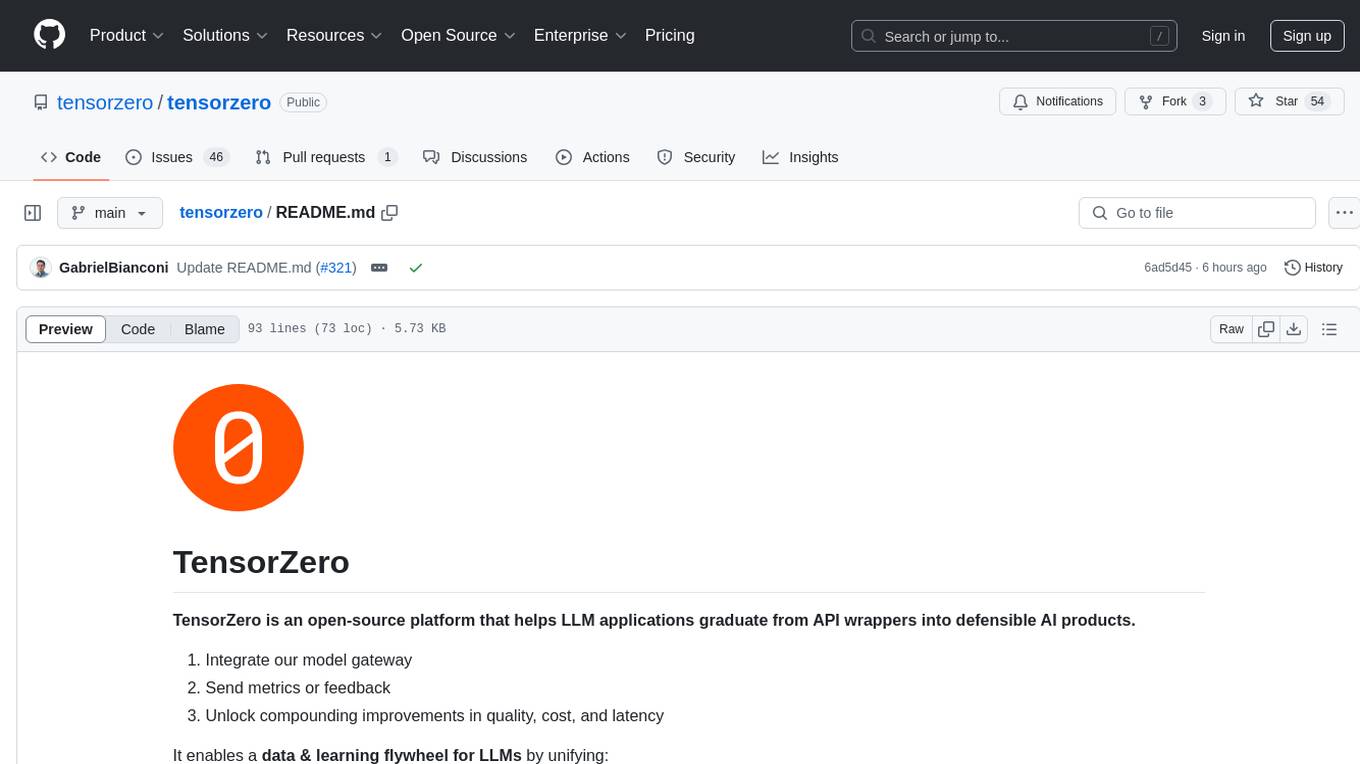
tensorzero
TensorZero is an open-source platform that helps LLM applications graduate from API wrappers into defensible AI products. It enables a data & learning flywheel for LLMs by unifying inference, observability, optimization, and experimentation. The platform includes a high-performance model gateway, structured schema-based inference, observability, experimentation, and data warehouse for analytics. TensorZero Recipes optimize prompts and models, and the platform supports experimentation features and GitOps orchestration for deployment.
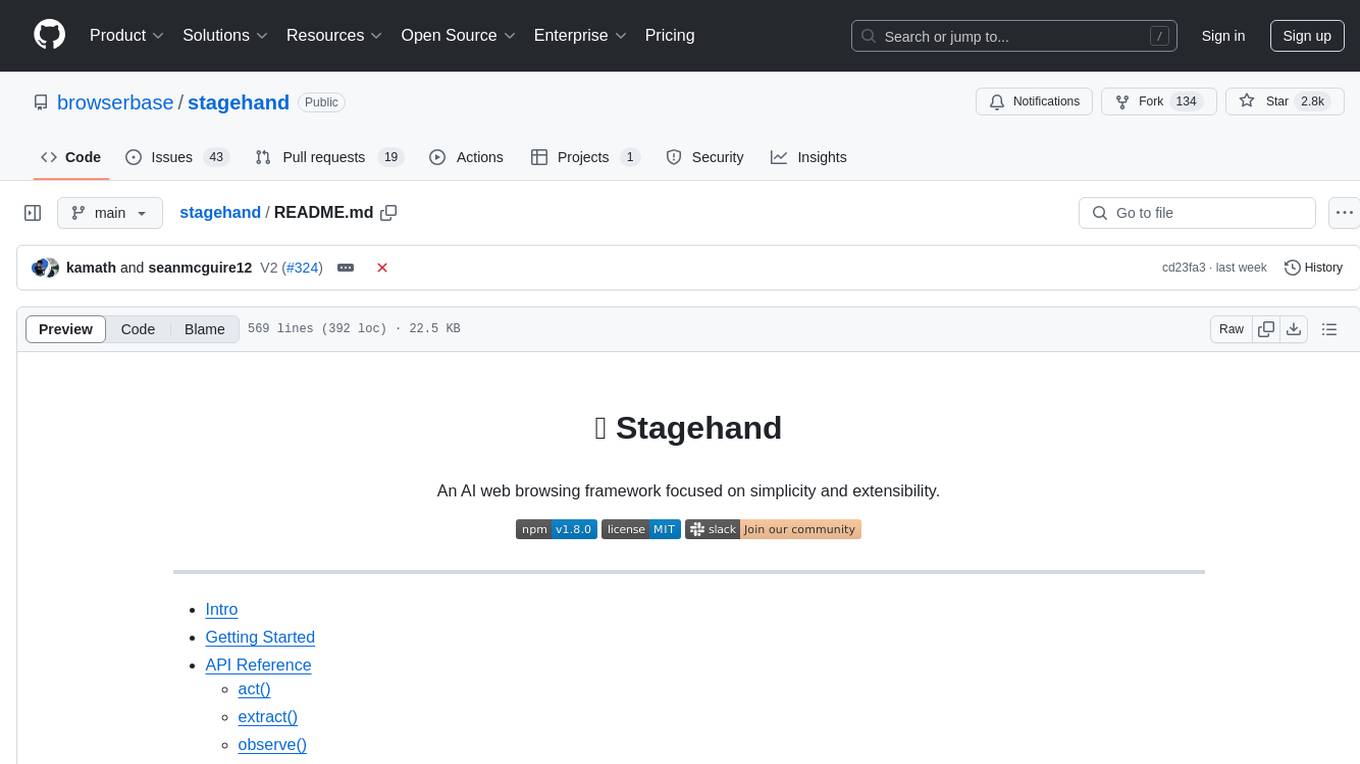
stagehand
Stagehand is an AI web browsing framework that simplifies and extends web automation using three simple APIs: act, extract, and observe. It aims to provide a lightweight, configurable framework without complex abstractions, allowing users to automate web tasks reliably. The tool generates Playwright code based on atomic instructions provided by the user, enabling natural language-driven web automation. Stagehand is open source, maintained by the Browserbase team, and supports different models and model providers for flexibility in automation tasks.
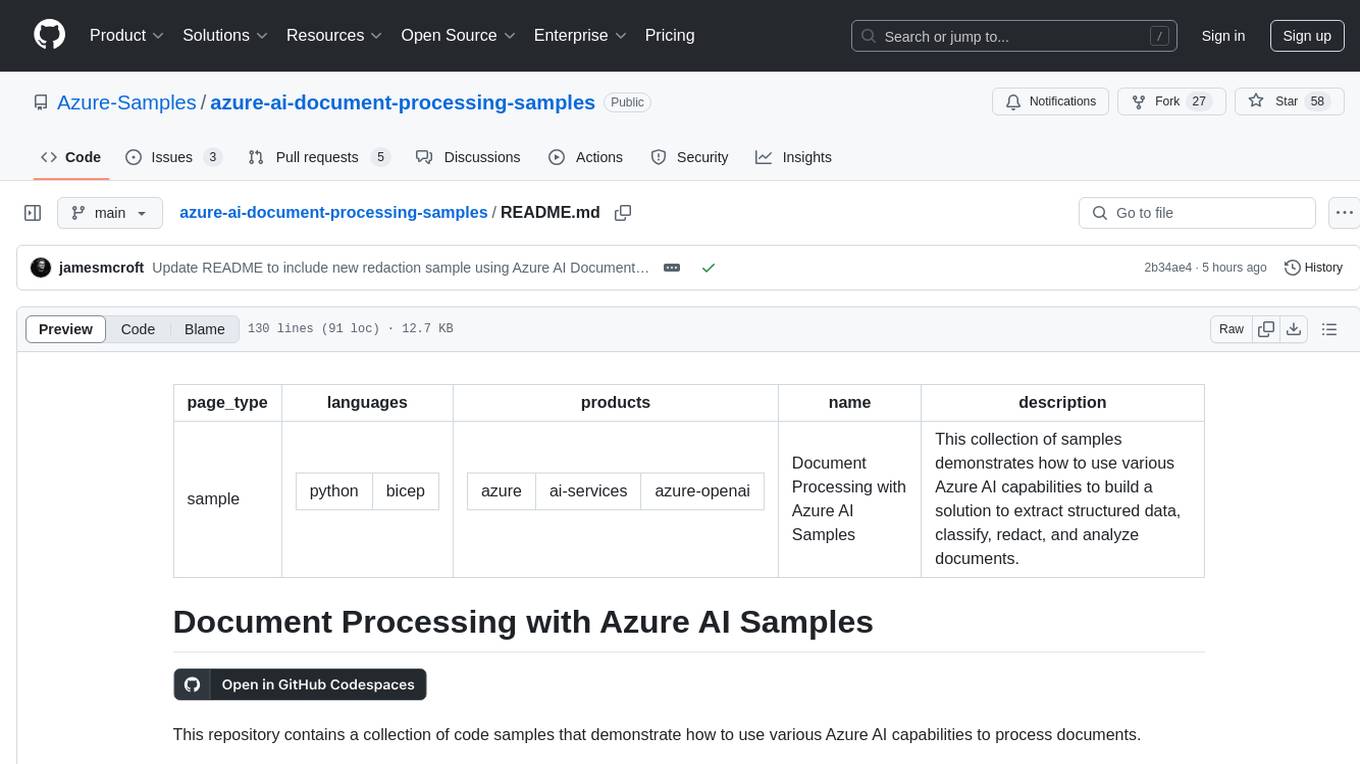
azure-ai-document-processing-samples
This repository contains a collection of code samples that demonstrate how to use various Azure AI capabilities to process documents. The samples help engineering teams establish techniques with Azure AI Foundry, Azure OpenAI, Azure AI Document Intelligence, and Azure AI Language services to build solutions for extracting structured data, classifying, and analyzing documents. The techniques simplify custom model training, improve reliability in document processing, and simplify document processing workflows by providing reusable code and patterns that can be easily modified and evaluated for most use cases.
For similar jobs

sweep
Sweep is an AI junior developer that turns bugs and feature requests into code changes. It automatically handles developer experience improvements like adding type hints and improving test coverage.

teams-ai
The Teams AI Library is a software development kit (SDK) that helps developers create bots that can interact with Teams and Microsoft 365 applications. It is built on top of the Bot Framework SDK and simplifies the process of developing bots that interact with Teams' artificial intelligence capabilities. The SDK is available for JavaScript/TypeScript, .NET, and Python.

ai-guide
This guide is dedicated to Large Language Models (LLMs) that you can run on your home computer. It assumes your PC is a lower-end, non-gaming setup.

classifai
Supercharge WordPress Content Workflows and Engagement with Artificial Intelligence. Tap into leading cloud-based services like OpenAI, Microsoft Azure AI, Google Gemini and IBM Watson to augment your WordPress-powered websites. Publish content faster while improving SEO performance and increasing audience engagement. ClassifAI integrates Artificial Intelligence and Machine Learning technologies to lighten your workload and eliminate tedious tasks, giving you more time to create original content that matters.

chatbot-ui
Chatbot UI is an open-source AI chat app that allows users to create and deploy their own AI chatbots. It is easy to use and can be customized to fit any need. Chatbot UI is perfect for businesses, developers, and anyone who wants to create a chatbot.

BricksLLM
BricksLLM is a cloud native AI gateway written in Go. Currently, it provides native support for OpenAI, Anthropic, Azure OpenAI and vLLM. BricksLLM aims to provide enterprise level infrastructure that can power any LLM production use cases. Here are some use cases for BricksLLM: * Set LLM usage limits for users on different pricing tiers * Track LLM usage on a per user and per organization basis * Block or redact requests containing PIIs * Improve LLM reliability with failovers, retries and caching * Distribute API keys with rate limits and cost limits for internal development/production use cases * Distribute API keys with rate limits and cost limits for students

uAgents
uAgents is a Python library developed by Fetch.ai that allows for the creation of autonomous AI agents. These agents can perform various tasks on a schedule or take action on various events. uAgents are easy to create and manage, and they are connected to a fast-growing network of other uAgents. They are also secure, with cryptographically secured messages and wallets.

griptape
Griptape is a modular Python framework for building AI-powered applications that securely connect to your enterprise data and APIs. It offers developers the ability to maintain control and flexibility at every step. Griptape's core components include Structures (Agents, Pipelines, and Workflows), Tasks, Tools, Memory (Conversation Memory, Task Memory, and Meta Memory), Drivers (Prompt and Embedding Drivers, Vector Store Drivers, Image Generation Drivers, Image Query Drivers, SQL Drivers, Web Scraper Drivers, and Conversation Memory Drivers), Engines (Query Engines, Extraction Engines, Summary Engines, Image Generation Engines, and Image Query Engines), and additional components (Rulesets, Loaders, Artifacts, Chunkers, and Tokenizers). Griptape enables developers to create AI-powered applications with ease and efficiency.


